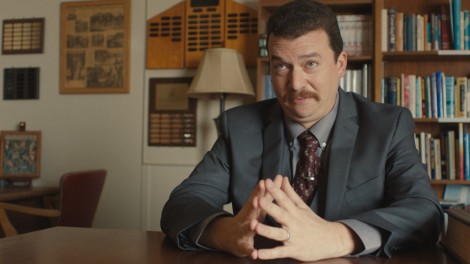
What: Film Review
Directed by: Jared Hess
Written by: Jared Hess and Jerusha Hess
Produced by: Dave Hunter, Jason Hatfield, Brandt Andersen
Starring: Sam Rockwell, Amy Ryan, Jemaine Clement, Danny McBride, Leslie Bibb, Will Forte, Steve Park, Sky Elobar
Language: English
Running Time (in min.): 90 minutes
Rating: Not Yet Rated
Official Selection of the 2015 Sundance Film Festival
****
As a professional critic, it’s been important to me to show understanding and compassion to those who do not see what I see in certain films, or vice versa. It’s just good manners, first of all, but empathizing even with full-blown disagreement is what makes movies special: the more divided the audiences, the richer the text. In very particular cases, however, it baffles me when I come across a person who does not agree with my affection and adulation for a movie. One of those cases has plagued me for years in regards to a cultural touchstone both beloved by some and reviled by others: Jared Hess’s 2004 Sundance smash Napoleon Dynamite.
In the decade since Hess and Jerusha, his wife and a filmmaker as well with whom he’s co-written each of his scripts, exploded into American independent film, I’ve wondered what makes Napoleon work so well for some and so poorly for others. To me, it’s a pure laugh riot with a classic anti-climax; visually stylish, droll, and jaded. The Hesses lampoon the social mores and tastes of the Midwest with so much mirth that I can’t help but feel compatriotic to them. The same appeal carried over to lesser, but still lasting, effect with Hess’s second feature, Nacho Libre [2006]. That film, set at a goofy Mexican orphanage, demonstrated that Hess could handle significant budgets and Hollywood stars like Jack Black without sacrificing his particular aesthetic or the joke-a-minute pacing.
But something went wrong with his third feature, Gentlemen Broncos [2009], which came across as conceptually overblown and nastily quaint in precisely the way Napoleon Dynamite had been classified. For one, the script had abandoned the latent critiques of class structure, white trash identity, and regionalism that simmered just below the surfaces of Hess’s previous work for more well-intentioned and understanding characterizations. A deeper, more mature protagonist was embodied by the choice to cast Michael Angarano against the three goofiest living actors: Jemaine Clement, Jennifer Coolidge, and the incorrigible Sam Rockwell. As they three went loud, Angarano went small, and Gentlemen Broncos went too easy on the types of people the filmmakers had so successfully mocked in their previous work.

Defending Napoleon Dynamite to haters was harder than ever after that, but the biggest challenge to that film’s fans has come in the form of Hess’s newest feature, Don Verdean. Rockwell returns (to star and executive produce) as the titular biblical archaeologist with shady international associates and an even more disreputable list of “discoveries.” After he and his doe-eyed assistant Carol (the ever-accountable Amy Ryan in her most impactful comic lead yet) shoot to the front of many international newscasts, Don finds his con-artistry sponsored by an obstreperous pastor and his wife (Danny McBride and Leslie Bibb.) Eager to please, Verdean becomes tied up in increasingly sleazy and deceitful schemes with an Israeli mercenary named Boaz (Jemaine Clement with an unbearable accent), who has no qualms about reconstructing Lot’s Wife out of clay when money from warring churches is on the line.
Though the Hesses have once again ventured into high-concept action-comedy territory – and few writers manage to manifest their imaginations or their scorn so effectively as these two – what once defined their films has faded from view in all but the clunky direction of the actors. Aside from an amusing video-format prologue and serious subtextual concern with the line between blind faith and stupidity, Don Verdean is an aesthetic bore, lacking any of the moseying montages or intentionally low-budg visual effects that typified the preceding works. Matthias Troelstrup’s cinematography, while sturdy, rarely makes itself known except to reveal Richard A. Wright’s spetacle-driven production design. Supposedly big “reveals” of Verdean’s discoveries in the Middle East (played here by on location sets in Utah) elicited light chuckles at the film’s World Premiere at the 2015 Sundance Film Festival.

Half the problem is cast-based, with none but Rockwell and Ryan making it out alive. Clement is particularly grating, not only because Boaz lacks anything near familiar human behavior or voice, but also due to the actor’s stellar performance in another Sundance premiere, Jim Strouse’s People, Places, Things [2015]. The disparity between these roles helps to show off Clement’s undeniable range, but Boaz is otherwise nothing but a joke receptacle and irritant. Similarly, the usually solid McBride and Bibb are both coasting as the Lazaruses, the former on his Foot Fist Way [2006] pompous dimwit image, the latter on a more vaguely Christian version of the tonally similar Talladega Nights [2006, dir. Adam McKay.]
How, then, to reconcile Don Verdean in the lineage of these once-promising filmmakers, whose work continues down a path of overpolishing and simplifying? My suggestion is to consider Verdean a practice round for ever-bigger-budget filmmaking from the Hesses, who with the right encouragement, production supervisors, and resources have proven their mettle as quirk-mavens at the level of early Wes Anderson and Todd Rohal. Gone are the belly laughs and the lightning-in-a-bottle timing that made Napoleon such a phenomenon. But who knows? Maybe lightning can strike twice.

Pingback: Interview with Jemaine Clement | CineMalin: Film Commentary and Criticism·